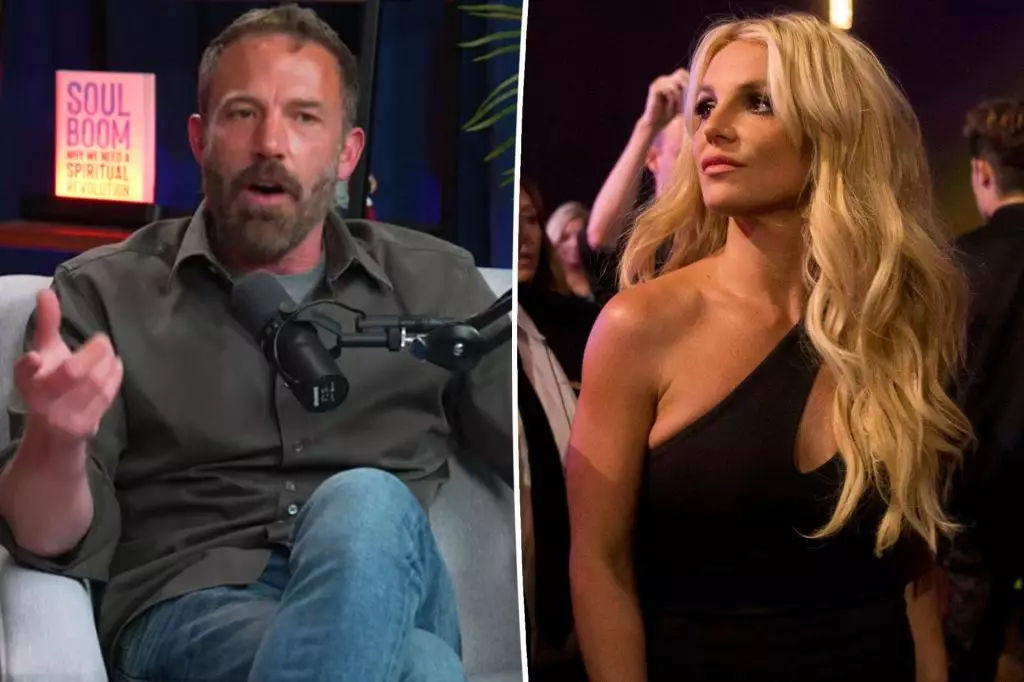Celebrity culture often thrives on the dubious line between public fascination and personal plight. Recently, Ben Affleck drew attention in a conversation on the “This Past Weekend With Theo Von” podcast, where he opened up about his past feelings of empathy for pop icon Britney Spears. His reflections not only reveal the emotional toll that public scrutiny can exert on celebrities but also illuminate a broader critique of societal attitudes towards mental health and celebrity culture.
The Weight of Paparazzi Attention
Affleck’s insights into the invasive nature of paparazzi highlight a critical issue: the harrowing reality that public figures often endure amidst their own struggles. He articulated a profound sense of empathy for Spears during her tumultuous years, acknowledging how relentless media attention exacerbated her vulnerabilities. “I really had a lot of empathy for Britney Spears,” he stated, emphasizing the unique form of suffering celebrities can face when their private battles are thrust into the public eye.
This line of thought invites an exploration of how the media landscape can unwittingly contribute to a culture of cruelty. Instead of serving as mere observers, paparazzi can morph into catalysts for distress, with their incessant photographing amplifying feelings of inadequacy and instability. Those iconic images of Spears during her breakdown—shaving her head, struggling through a custody battle—are more than just snapshots; they are symbols of a much larger conversation about fame, mental health, and the ethics of celebrity commentary.
Cultural Cruelty and Collective Responsibility
Affleck described the phenomenon he observed as an “unintentional collective cruelty” that society seems to allow or endorse. This notion challenges actors like himself to confront their role within a system that commodifies suffering. He likens the situation to “poking the tiger,” where the nuances and motivations behind the behavior are lost to the sensationalism of the moment. The public, too, bears responsibility: do we not, by engaging with this content, become complicit in the very cycle that damages those we idolize?
The time when Spears faced overwhelming scrutiny, particularly around 2007, serves as a case study in this larger narrative. The mental health crisis that ensued didn’t just affect her—it opened a window for the public to witness the ramifications of fame. Affleck’s empathy reminds us that behind the lens lies a human being, deserving of compassion and understanding rather than ridicule. When scrolling through images or headlines about celebrities, one must consider the emotional landscape that such a moment may represent.
The Dissonance of Public Perception
As Affleck’s remarks gained traction, it became evident that they also sparked renewed dialogue about celebrity interactions. His reference to not knowing Spears personally does not diminish the validity of his feelings regarding the media’s treatment of her. The absurdity of celebrities being scrutinized for their private lives while simultaneously being perceived as distant figures in the public eye reveals a complex dissonance. Affleck himself was caught in this web when Spears jokingly claimed to have kissed him years ago; it points to the absurdity that surrounds celebrity interactions, often leading to mischaracterizations and misunderstandings that are fodder for tabloids.
His decision to dodge inquiries regarding the alleged makeout session emphasizes a potent point—both celebrities and the public often grapple with how to negotiate their identities in light of past experiences. For Affleck, the focus appears to have shifted towards a more profound consideration of mental health and familial bonds, all while navigating his own public persona within an environment that can be as unforgiving as it is adulating.
A Call for Compassion in Celebrity Culture
Ultimately, Affleck’s reflections serve as a poignant reminder of the importance of compassion within the celebrity realm. As society becomes more aware of mental health issues, the dialogue surrounding dependency on paparazzi and muted empathy must evolve. The emphasis should transition towards supporting rather than scrutinizing those who experience the brunt of public interest.
While celebrity culture will persist, the lens through which audiences view it can—and should—shift from one of voyeurism to one of understanding. Personal struggles, much like Affleck’s empathy for Spears, deserve acknowledgment and respect rather than continual dehumanization. In an age where every moment is documented and dissected, fostering a sense of kindness and empathy might be the truest form of cultural evolution we can aspire towards.

